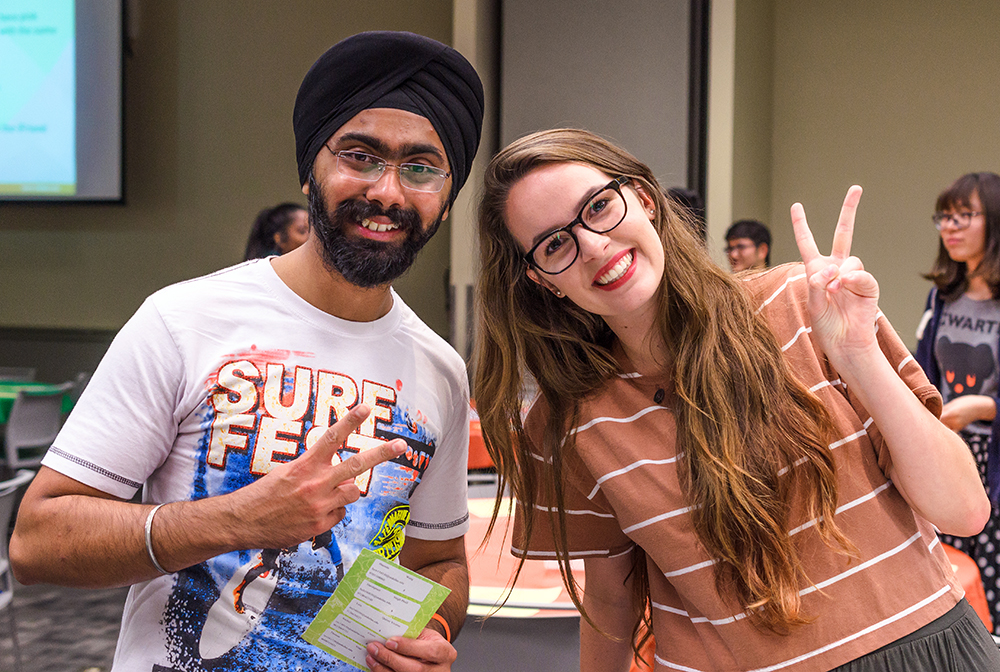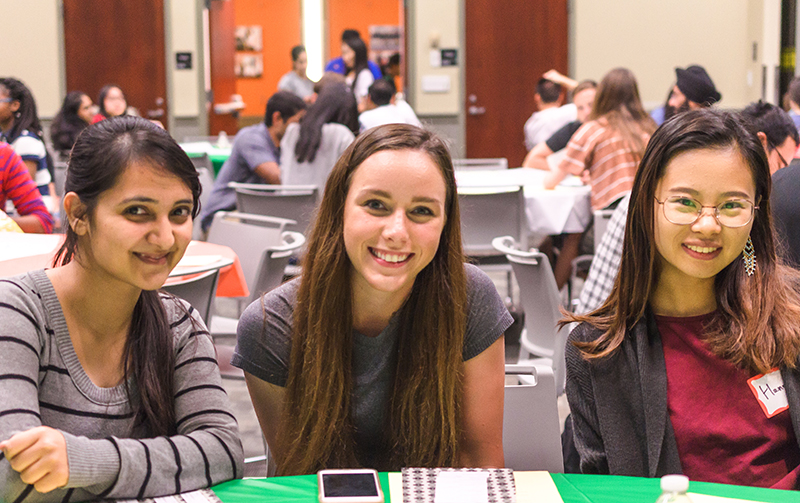
Harshpreet Singh Phull (left) and Rachel Crews look forward to getting to know each other after they were matched together in the UT Dallas cultural exchange program iFriend. This is Singh Phull’s first time participating in the program, while Crews participated last semester.
Coming from different parts of the globe, Rachel Crews and Harshpreet Singh Phull might never have crossed paths and struck up a friendship on the campus of The University of Texas at Dallas.
Thanks to a cultural exchange program that matches UT Dallas students with incoming international students, the two have found themselves part of a group that will connect weekly for social gatherings and service activities.
IFriend, a program begun in 2010 and organized by the International Center and the Office of Student Volunteerism (OSV), helps UT Dallas students learn about new cultures and make new friends.
Singh Phull came to UT Dallas this fall to work on a master’s degree in electrical engineering. He found information about iFriends on the International Center’s webpage, and has been matched with Crews and three other students this year.
“I found it to be very interesting,” he said of the program. “I am looking for friends, and I enjoy learning about new cultures and learning the language.”
Crews, a speech pathology senior from Texarkana, Texas, participated in the program last year. She said she signed up again because she had “a really good experience last time.”
“I became good friends last year with a girl from China. We’d go to Chinese restaurants and she would help me order food,” Crews said. “We also did local things on campus — had lunches together and watched a movie.”
The iFriend program helps smooth the wheels of friendship by helping students interact through structured activities, said Mackenzie Hunter, program coordinator for OSV.
“It’s a platform for introducing students to people and ideas to which they might not otherwise be exposed,” Hunter said.

From left: Apurva Vyas, Olivia Frazier and Huang Zhu were matched together as part of the program.
Students in the eight-week program take a field trip to the Texas State Fair, volunteer at area nonprofits and participate in game nights and holiday parties. Along the way, they post photos of their groups on social media channels and create a video or skit to share what they’ve learned at a November banquet.
A little friendly competition helps groups stay motivated to spend time together, Hunter said. Groups accumulate “points” each time they attend iFriend events and participate in group service projects. At semester’s end, prizes are given to groups that accumulate the most service hours, the most posts on social media and the most attended iFriend events.
Akib Chowdhury, a psychology and child development sophomore in the School of Behavioral and Brain Sciences, said iFriend is a practical way for him to help other international students adjust to a new culture. Originally from Bangladesh, his family moved to Houston when he was 9 years old.
“I understand how someone’s culture affects a move from there to here. I had to adjust to it, too,” he said. “I want to give it up to other people — take them places and help them understand different things. And try different food. Food is my favorite thing to talk about.”
Nick Brouwer, an international political economy junior in the School of Economic, Political and Policy Sciences, has participated as an iFriend every semester he has been at UT Dallas. Even when students’ personalities don’t mesh, he said he still finds the program rewarding.
“I’ve had some annoying personalities — just people you wouldn’t normally hang out with — but I always enjoy the activities we do together,” Brouwer said.
IFriend helps both U.S. and international students improve their intercultural communication skills, program coordinator Katie Knable said.
“Students not only learn about new cultures, they also learn more about their own culture and how it is presented to the world. IFriend gives students a different perspective than they had before they participated in the program,” Knable said.